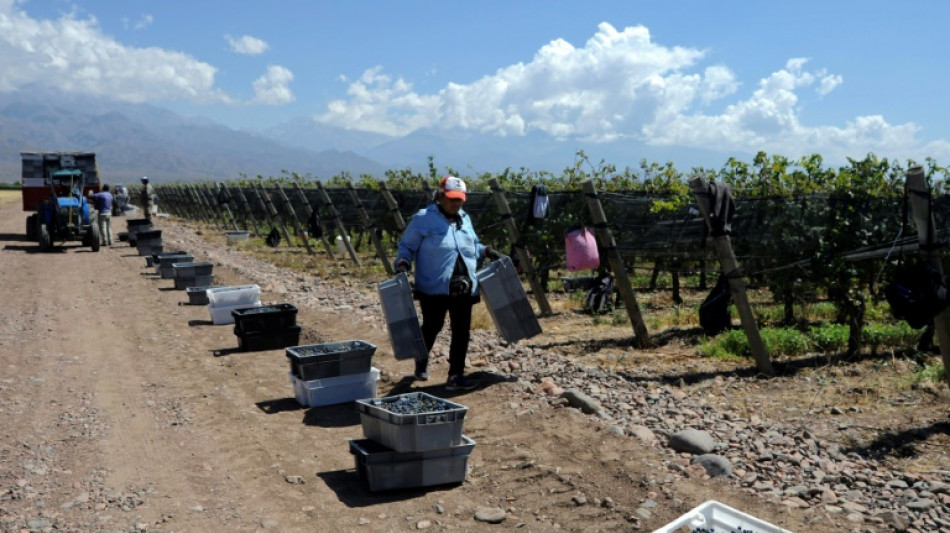
-
 Myanmar pro-military party claims Suu Kyi's seat in junta-run poll
Myanmar pro-military party claims Suu Kyi's seat in junta-run poll
-
Fed chair Powell says targeted by federal probe

-
 Trailblazing Milos Raonic retires from tennis
Trailblazing Milos Raonic retires from tennis
-
Australia recalls parliament early to pass hate speech, gun laws

-
 'One Battle After Another,' 'Hamnet' triumph at Golden Globes
'One Battle After Another,' 'Hamnet' triumph at Golden Globes
-
Japan aims to dig deep-sea rare earths to reduce China dependence

-
 Top UN court to hear Rohingya genocide case against Myanmar
Top UN court to hear Rohingya genocide case against Myanmar
-
US sends more agents to Minneapolis despite furor over woman's killing

-
 Trump says Iran 'want to negotiate' after reports of hundreds killed in protests
Trump says Iran 'want to negotiate' after reports of hundreds killed in protests
-
Bangladesh's powerful Islamists prepare for elections

-
 NBA-best Thunder beat the Heat as T-Wolves edge Spurs
NBA-best Thunder beat the Heat as T-Wolves edge Spurs
-
Ukraine's Kostyuk defends 'conscious choice' to speak out about war

-
 Trump says working well with Venezuela's new leaders, open to meeting
Trump says working well with Venezuela's new leaders, open to meeting
-
Asian equities edge up, dollar slides as US Fed Reserve subpoenaed

-
 Hong Kong court hears sentencing arguments for Jimmy Lai
Hong Kong court hears sentencing arguments for Jimmy Lai
-
Powell says Federal Reserve subpoenaed by US Justice Department

-
 Chalamet, 'One Battle' among winners at Golden Globes
Chalamet, 'One Battle' among winners at Golden Globes
-
Turning point? Canada's tumultuous relationship with China

-
 Eagles stunned by depleted 49ers, Allen leads Bills fightback
Eagles stunned by depleted 49ers, Allen leads Bills fightback
-
Globes red carpet: chic black, naked dresses and a bit of politics

-
 Maduro's fall raises Venezuelans' hopes for economic bounty
Maduro's fall raises Venezuelans' hopes for economic bounty
-
Golden Globes kick off with 'One Battle' among favorites

-
 Australian Open 'underdog' Medvedev says he will be hard to beat
Australian Open 'underdog' Medvedev says he will be hard to beat
-
In-form Bencic back in top 10 for first time since having baby

-
 Swiatek insists 'everything is fine' after back-to-back defeats
Swiatek insists 'everything is fine' after back-to-back defeats
-
Wildfires spread to 15,000 hectares in Argentine Patagonia

-
 Napoli stay in touch with leaders Inter thanks to talisman McTominay
Napoli stay in touch with leaders Inter thanks to talisman McTominay
-
Meta urges Australia to change teen social media ban

-
 Venezuelans await political prisoners' release after government vow
Venezuelans await political prisoners' release after government vow
-
Lens continue winning streak, Endrick opens Lyon account in French Cup

-
 McTominay double gives Napoli precious point at Serie A leaders Inter
McTominay double gives Napoli precious point at Serie A leaders Inter
-
Trump admin sends more agents to Minneapolis despite furor over woman's killing

-
 Allen magic leads Bills past Jaguars in playoff thriller
Allen magic leads Bills past Jaguars in playoff thriller
-
Barca edge Real Madrid in thrilling Spanish Super Cup final

-
 Malinin spearheads US Olympic figure skating challenge
Malinin spearheads US Olympic figure skating challenge
-
Malinin spearheads US figure Olympic figure skating challenge

-
 Iran rights group warns of 'mass killing', govt calls counter-protests
Iran rights group warns of 'mass killing', govt calls counter-protests
-
'Fragile' Man Utd hit new low with FA Cup exit

-
 Iran rights group warns of 'mass killing' of protesters
Iran rights group warns of 'mass killing' of protesters
-
Demonstrators in London, Paris, Istanbul back Iran protests

-
 Olise sparkles as Bayern fire eight past Wolfsburg
Olise sparkles as Bayern fire eight past Wolfsburg
-
Man Utd knocked out of FA Cup by Brighton, Martinelli hits hat-trick for Arsenal

-
 Troubled Man Utd crash out of FA Cup against Brighton
Troubled Man Utd crash out of FA Cup against Brighton
-
Danish PM says Greenland showdown at 'decisive moment' after new Trump threats

-
 AC Milan snatch late draw at Fiorentina as title rivals Inter face Napoli
AC Milan snatch late draw at Fiorentina as title rivals Inter face Napoli
-
Venezuelans demand political prisoners' release, Maduro 'doing well'

-
 'Avatar: Fire and Ashe' leads in N.America for fourth week
'Avatar: Fire and Ashe' leads in N.America for fourth week
-
Bordeaux-Begles rout Northampton in Champions Cup final rematch

-
 NHL players will compete at Olympics, says international ice hockey chief
NHL players will compete at Olympics, says international ice hockey chief
-
Kohli surpasses Sangakkara as second-highest scorer in international cricket


Race against time to rescue Argentina wine grapes
In Argentina's Valle de Uco wine region, at the foot of the Andes, frantic picking is under way to try and save what remains of what is predicted to be the worst grape harvest in decades.
It is a race against time in the fabled Mendoza wine region in the west of the South American country once again in the grip of La Nina, a periodic weather phenomenon that cools surface temperatures and intensifies drought.
"We hurry... because we are afraid of another frost," enologist Marcelo Pelleriti of the Monteviejo winery told AFP.
"In a year like this, anything is possible," he added of "one of the most difficult (seasons) in the wine history of the province of Mendoza" where 78 percent of Argentina's wine comes from, mainly reds.
Frost, hail, extreme temperatures and drought... the vines suffered much these past months.
Cellar master Jose Mounier shows AFP the damage caused by frost at the flowering stage to a cluster of cabernet franc grapes, misshapen beyond recognition.
"Fewer grapes means more work," he explained -- with pickers having to separate healthy grapes from damaged ones by hand.
"We must still create a wine with these problems in mind," he said.
Monteviejo -- a large vineyard between 1,000 and 1,200 meters above sea level -- expects to have a harvest 50 percent smaller than last year.
Some others in the region lost everything.
- Worst harvest -
For Argentina as a whole, the 2023 harvest will not exceed 15.4 million tons of grapes, according to projections by the National Institute of Vitiviniculture (INV).
This is about 40 percent less than a "normal" year for a country that oscillates between five and seven on the world's top-ten wine producers' list.
The final numbers will be known in May. In 2021, the harvest was 22.2 million tonnes.
"We are looking at the worst harvest in more than 20 years, perhaps in 60," said Mario Gonzalez, president of the Argentine Wine Corporation (Coviar).
The country has just emerged from two good commercial wine years, linked directly to increased home consumption during the Covid-19 pandemic.
The domestic market accounts for about 70 percent of Argentine wine sales, and in 2020 and 2021 reached some 20 or 21 liters per person per year.
In 2022, that was down again to about 18 liters.
In 1977, when consumption peaked, Argentines drank some 88 bottles each on average.
The 2022 drop "will have a strong impact" on the industry, said Gonzalez..
In addition, soaring inflation -- reaching 94.8 percent in 2022 -- is eroding Argentine purchasing power.
- 'Malbec dollar' -
A worried wine sector has received a welcome boost from Economy Minister Sergio Massa in recent days.
As it did last year with soy -- the main export product of a country subject to wild exchange rate swings -- the government announced it would apply a separate, preferential rate for wine exporters more favorable than the official rate of 210 pesos to the US dollar.
It has been dubbed the "Malbec dollar" by local media.
Yet, wine producers expect the hardships will continue this coming season.
First, farmers will have to decide whether or not to replant vines that froze irreparably, keeping in mind that profitability has been on the decline for years.
And with a wary eye on a changing climate.
Spells of frost or hail that once came only about every five or ten years, said Pelleriti, now hit vineyards "in a more repetitive way."
M.Qasim--SF-PST



